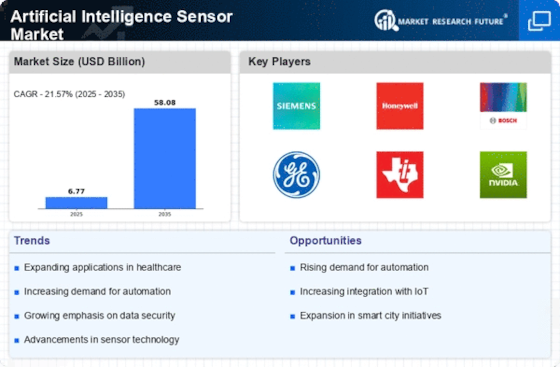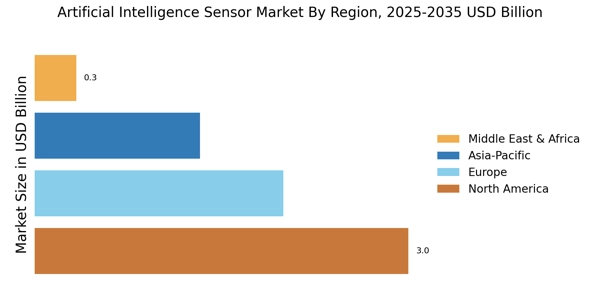Rising Demand for Smart Devices
The proliferation of smart devices is a key driver for the Artificial Intelligence Sensor Market. As consumers increasingly adopt smart home technologies, the demand for sensors that can integrate with these devices has surged. For instance, the market for smart home devices is projected to reach USD 174 billion by 2025, indicating a robust growth trajectory. This trend necessitates advanced sensors capable of processing data in real-time, thereby enhancing user experience and functionality. Furthermore, the integration of AI in these sensors allows for improved decision-making capabilities, making them more appealing to manufacturers and consumers alike. Consequently, the rising demand for smart devices is likely to propel the growth of the Artificial Intelligence Sensor Market, as companies strive to innovate and meet consumer expectations.
Integration of AI in Industrial IoT
The integration of artificial intelligence in the Industrial Internet of Things (IIoT) is a pivotal driver for the Artificial Intelligence Sensor Market. As industries increasingly adopt IoT technologies, the need for intelligent sensors that can collect and analyze data in real-time becomes paramount. The IIoT market is expected to reach USD 1.1 trillion by 2025, with a significant portion attributed to AI-driven sensor technologies. These sensors enhance operational efficiency, predictive maintenance, and supply chain management, thereby reducing costs and improving productivity. As industries recognize the value of AI in optimizing processes, the demand for advanced sensors is likely to escalate, further fueling the growth of the Artificial Intelligence Sensor Market.
Increased Investment in Smart Cities
The Artificial Intelligence Sensor Industry. Governments and municipalities are investing heavily in infrastructure that incorporates AI-driven sensors to enhance urban living. For instance, the smart city market is anticipated to reach USD 2.57 trillion by 2025, with a substantial portion allocated to sensor technologies. These sensors play a pivotal role in traffic management, waste management, and energy efficiency, thereby improving the quality of life for residents. As cities become more interconnected, the demand for sophisticated AI sensors that can analyze and respond to real-time data will likely increase, further propelling the growth of the Artificial Intelligence Sensor Market.
Growing Focus on Environmental Monitoring
The heightened awareness of environmental issues is driving the demand for AI sensors in the Artificial Intelligence Sensor Market. As climate change and pollution become pressing concerns, there is a growing need for advanced monitoring systems that can provide real-time data on air and water quality. The environmental monitoring market is projected to grow at a CAGR of 20% over the next five years, indicating a robust demand for AI-enabled sensors. These sensors can analyze environmental data more accurately and provide actionable insights, which is crucial for regulatory compliance and public health. Consequently, the focus on environmental monitoring is likely to stimulate innovation and investment in the Artificial Intelligence Sensor Market.
Advancements in Machine Learning Algorithms
The continuous evolution of machine learning algorithms significantly influences the Artificial Intelligence Sensor Market. Enhanced algorithms enable sensors to process vast amounts of data more efficiently, leading to improved accuracy and reliability. For example, the implementation of deep learning techniques has shown to enhance object recognition capabilities in sensors, which is crucial for applications in security and surveillance. As machine learning technology matures, it is expected that the market for AI sensors will expand, with a projected growth rate of 25% annually over the next five years. This advancement not only boosts the performance of existing sensors but also opens avenues for new applications, thereby driving the overall growth of the Artificial Intelligence Sensor Market.
















